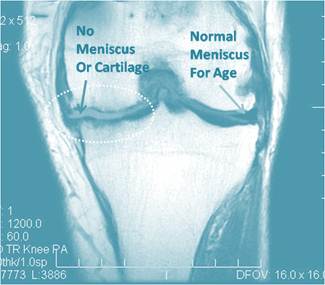What predicts which patients will need a knee replacement?
Interesting recent study on which MRI and other findings predict which patients will need a knee replacement surgery. The study followed 161 patients with knee arthritis until 18 of them needed knee replacement surgery. So what MRI findings predicted if they were likely to need a knee replacement surgery MRI? One that was associated was “bone marrow lesions”. These are areas of swelling in the bone that are caused by not enough cartilage cushioning the joint. This lack of shock absorption by the bad or lost arthritic cartilage leads to forces being transmitted to the bone and swelling in the bone. How can bone react, isn’t it like cement? Most knee arthritis patients believe that bone is like cement, but in fact it’s living tissue that reacts to forces. It’s this reactivity to forces that cause a bone spur to form. In the case of a bone spur, the bone literally grows more of itself in response to the forces on a joint. What other things were associated with someone who needed a knee replacement? Patients with less joint width on the arthritic side were also more likely to need a knee replacement surgery. In addition, an extruded meniscus was also connected to needing a knee replacement. We’ve discussed this displaced meniscus syndrome in this blog, which is more common after parts of the meniscus have been surgically removed. Finally, a severe medial meniscus tear was also associated with needing a knee replacement. The upshot? This seems to be an important study that may help doctors decide which MRI findings predict knee replacement candidates versus which patients might benefit from biologic injections or physical therapy.

If you have questions or comments about this blog post, please email us at [email protected]
NOTE: This blog post provides general information to help the reader better understand regenerative medicine, musculoskeletal health, and related subjects. All content provided in this blog, website, or any linked materials, including text, graphics, images, patient profiles, outcomes, and information, are not intended and should not be considered or used as a substitute for medical advice, diagnosis, or treatment. Please always consult with a professional and certified healthcare provider to discuss if a treatment is right for you.

